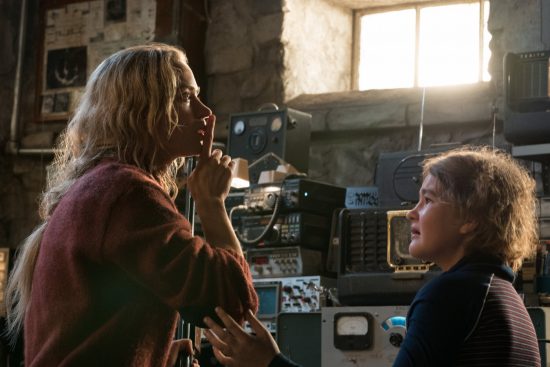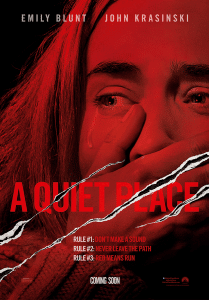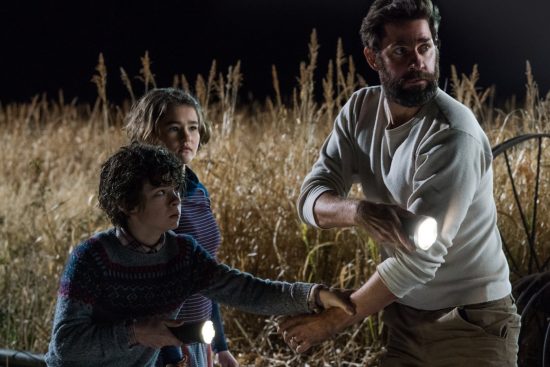 How times change. A decade ago, it might not have come as a surprise to see a horror film which opens on the Platinum Dunes logo top the box office on its opening weekend; but we certainly wouldn’t have expected it to be an all-new original work, much less – gasp – a good film. There’s been a bit of buzz this week over the Michael Bay/Brad Fuller-run production house announcing that they’re done with horror remakes for good, although many years back they had quietly declared they intended to step away from the genre en masse; I wrote a very snarky article on the subject at the time entitled There Is A God: Platinum Dunes Quit Horror (don’t look for it, it didn’t survive the move from this site’s former incarnation Brutal As Hell). However, in the years since Platinum Dunes have brought us the thoroughly enjoyable TV series Black Sails, and – in cahoots with Blumhouse, who have long since stolen their crown as kings of mainstream horror – they’ve co-produced the provocative and often-entertaining Purge series, as well as the two Ouija movies (of which, Mike Flanagan’s second film at least was good).
How times change. A decade ago, it might not have come as a surprise to see a horror film which opens on the Platinum Dunes logo top the box office on its opening weekend; but we certainly wouldn’t have expected it to be an all-new original work, much less – gasp – a good film. There’s been a bit of buzz this week over the Michael Bay/Brad Fuller-run production house announcing that they’re done with horror remakes for good, although many years back they had quietly declared they intended to step away from the genre en masse; I wrote a very snarky article on the subject at the time entitled There Is A God: Platinum Dunes Quit Horror (don’t look for it, it didn’t survive the move from this site’s former incarnation Brutal As Hell). However, in the years since Platinum Dunes have brought us the thoroughly enjoyable TV series Black Sails, and – in cahoots with Blumhouse, who have long since stolen their crown as kings of mainstream horror – they’ve co-produced the provocative and often-entertaining Purge series, as well as the two Ouija movies (of which, Mike Flanagan’s second film at least was good).
Just goes to show, even those we might historically dismiss as the worst of the worst can indeed acknowledge they’ve done wrong, and atone for past mistakes, as now, independent of Blumhouse, Platinum Dunes have produced what has to be the most interesting, unusual mainstream horror movie since – watch out, here comes the obvious point of reference – 2017’s Get Out. While director John Krasinski’s film isn’t quite so ground-breaking or powerful as Jordan Peele’s awards-grabbing debut, it is very effective indeed, and really pushes the envelope for what we might expect from a wide release, multiplex-friendly genre entry. Where just about every major horror movie of the past two decades has been marketed as a dare to audiences to test their mettle, A Quiet Place presents an even greater challenge: can a contemporary cinema audience shut the fuck up for an hour and a half?

As the movie begins, it’s some months after some initially unclear circumstances have resulted in what seems to be the total breakdown of society as we know it. We meet a family (according to IMDb they’re called the Abbots and all have designated first names, though I’m damned if I remember them ever being used in any form) who are on what might have been a routine visit to the pharmacist, except the pharmacy in question is deserted, as is the small town around it; and every step of the way, the family are extremely careful to make no noise whatsoever, to the extent that they walk barefoot. They also communicate by sign language, a skill they had presumably all mastered in years gone by due to the deafness of the eldest child of the family (Millicent Simmonds, a young actress who is indeed deaf). It soon becomes clear why they have to live this way, as roaming the woods nearby are several carnivorous monsters with extreme sensitivity to sound, who attack with relentless speed and brutality whenever a noise reaches them. Living as quietly and simply as possible on their remote farm, the family do their best to get by whilst trying hold out hope that help will eventually come. However, as Evelyn (Emily Blunt) is pregnant, the chances of maintaining silence indefinitely seem very slim indeed.
The concept of a horror movie in which the protagonists can make no sound clearly had the potential to get gimmicky. On paper, it doesn’t feel too far removed from those stay in the light/stay out of the light movies like Pitch Black, Darkness Falls, Lights Out; or, with the need to stay quiet, it might be in a similar vein to 2016’s Don’t Breathe. And again, particularly considering that this is a Platinum Dunes production, we could easily have wound up with something more along those lines. It seems like a minor miracle that they didn’t insist on casting a mini-skirted Megan Fox type as the teenage daughter, and/or heavily sexing up Emily Blunt’s mother.
Thankfully, whether it’s down to director Krasinski, the script he co-wrote with Scott Beck and Bryan Woods, or (gasp) Bay and Fuller at last understanding they don’t have to contrive for everything to appeal to adolescent boys, A Quiet Place stands worlds apart tonally. Sorry to bring up Get Out yet again, but it seems clear that this film has at last hammered home that which erudite horror fans have always known: immaturity is not the genre’s default setting. Supernatural beings and the threat of imminent, horrible death are not, and never have been incompatible with sober, level-headed treatment of grounded, character-based drama and existential anxiety, and A Quiet Place balances these elements beautifully.
 Sadly but not entirely unexpectedly, this has resulted in the film getting those same utterly bizarre “it’s not really horror” claims that plagued Get Out and It last year. Such claims are, of course, total unmitigated bollocks – and, on a related note, much the same can be said of those declarations that it can’t be real horror because it’s rated PG-13 (although, as tends to be the case with anything horrific, it’s been passed 15 in Britain). While graphic gore may be kept to a minimum, there are some remarkably well-crafted suspense sequences here; indeed, for pretty much the entire latter half of the movie it barely lets up at all, and particularly given that we have young children in peril throughout, it’s bound to cut close to the bone for many viewers. Still, even though we don’t see much blood, this isn’t one of those Lewton-esque efforts that reveals nothing: the monsters get plenty of screen time, and they’re impressively icky.
Sadly but not entirely unexpectedly, this has resulted in the film getting those same utterly bizarre “it’s not really horror” claims that plagued Get Out and It last year. Such claims are, of course, total unmitigated bollocks – and, on a related note, much the same can be said of those declarations that it can’t be real horror because it’s rated PG-13 (although, as tends to be the case with anything horrific, it’s been passed 15 in Britain). While graphic gore may be kept to a minimum, there are some remarkably well-crafted suspense sequences here; indeed, for pretty much the entire latter half of the movie it barely lets up at all, and particularly given that we have young children in peril throughout, it’s bound to cut close to the bone for many viewers. Still, even though we don’t see much blood, this isn’t one of those Lewton-esque efforts that reveals nothing: the monsters get plenty of screen time, and they’re impressively icky.
Box office takings are, of course, a very dubious measure of a film’s overall ‘success,’ but the fact that at the time of writing (after barely a week in cinemas) A Quiet Place has taken almost $90 million worldwide – unusually high numbers for a horror movie – feels like a good omen for the genre. Get Out and It were not anomalies; both the studios and the wider audience seem to be leaning toward genuinely well-made, inventive and hard-hitting horror movies with a brain as well as a pulse. Long may this continue.
A Quiet Place is in cinemas now.
